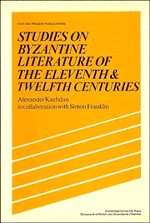Book contents
- Frontmatter
- Contents
- Prooemium
- Acknowledgement
- List of abbreviations
- I Approaches to the history of Byzantine civilization: from Krause to Beck and Mango
- II The social views of Michael Attaleiates
- III Theodore Prodromus: a reappraisal
- IV Eustathius of Thessalonica: the life and opinions of a twelfth-century Byzantine rhetor
- V Gregory Antiochus: writer and bureaucrat
- VI Nicephorus Chrysoberges and Nicholas Mesarites: a comparative study
- VII Nicetas Choniates and others: aspects of the art of literature
- Index
- Past and Present Publications
VI - Nicephorus Chrysoberges and Nicholas Mesarites: a comparative study
Published online by Cambridge University Press: 07 May 2010
- Frontmatter
- Contents
- Prooemium
- Acknowledgement
- List of abbreviations
- I Approaches to the history of Byzantine civilization: from Krause to Beck and Mango
- II The social views of Michael Attaleiates
- III Theodore Prodromus: a reappraisal
- IV Eustathius of Thessalonica: the life and opinions of a twelfth-century Byzantine rhetor
- V Gregory Antiochus: writer and bureaucrat
- VI Nicephorus Chrysoberges and Nicholas Mesarites: a comparative study
- VII Nicetas Choniates and others: aspects of the art of literature
- Index
- Past and Present Publications
Summary
One relatively minor incident in Byzantine history – the failed coup of John Comnenus the Fat in a.d. 1200 – is documented in the works of four contemporary rhetors: Nicetas Choniates, Euthymius Tornices, Nicephorus Chrysoberges, and Nicholas Mesarites. All four authors lived through the events; but while three of them provide roughly similar accounts, one, Nicholas Mesarites, stands apart from the rest. In the present study we shall examine the discrepancies between Mesarites' atypical narrative and that of the other three writers. Rather than look in detail at all three ‘orthodox’ accounts, we shall take one of them, that of Nicephorus Chrysoberges, as their representative.
Mesarites and Chrysoberges do not differ in their basic assessment of John Comnenus' initiative: both of them (and, indeed, Choniates and Tornices) are firmly on the side of the victor, the legitimate ruler, Alexius III Angelus. The differences are not, in the first instance, political, but aesthetic: Mesarites and Chrysoberges have fundamentally different ways of presenting events, of constructing a narrative.
Again, therefore, one faces the vexed problem of variety in Byzantine literature and, by implication, in Byzantine social and aesthetic perception. If two contemporary Byzantine authors differmarkedly in their narrative method, in their approach to the task of constructing a text, then one is bound to conclude that there was a measure of variety, perhaps even of division and argument, in Byzantine literary life.
- Type
- Chapter
- Information
- Publisher: Cambridge University PressPrint publication year: 1984
- 1
- Cited by

